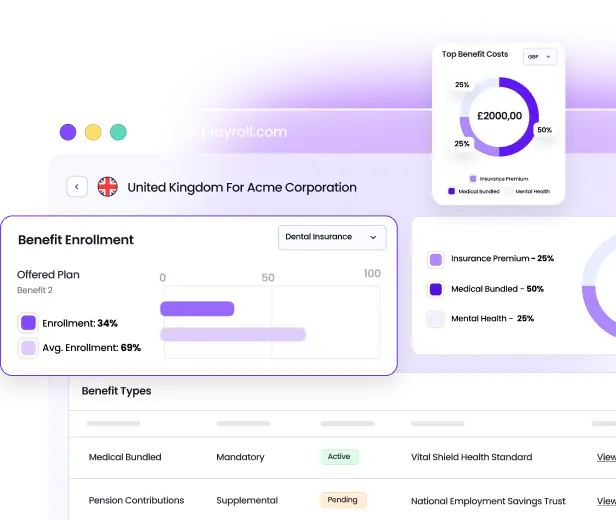Who Is Entitled to Employee Benefits In Antigua and Barbuda
In Antigua and Barbuda, employee benefits are governed by the Labour Code, Social Security Act, and other supporting regulations. All employees working under a formal employment contract – including full-time and many part-time employees – are entitled to a core set of benefits such as social security contributions, paid leave, and workplace protections.
Part-time, temporary, and fixed-term employees may also receive statutory benefits depending on their hours and duration of service. Once a legal employment relationship exists, employers must comply with benefit regulations and contribute to social protections accordingly.
Overview of Employee Benefits In Antigua and Barbuda
Employee benefits in Antigua and Barbuda balance mandatory protections with supplemental perks that employers can offer to enhance recruitment and retention. While the benefits structure is built around a robust social security system, employers often go beyond legal requirements to provide additional value in competitive industries like tourism and finance.
Mandatory Employee Benefits In Antigua and Barbuda
Mandatory benefits are legally required and form the core of any employee benefits package in Antigua and Barbuda. Here’s a comprehensive list of mandatory benefits in Antigua and Barbuda:
Social Security Contributions
Employers must register all eligible employees with the Social Security Board and make monthly contributions covering retirement, sickness, maternity, and disability benefits. These contributions are shared between the employer and employee and are critical for securing long-term employee welfare and income stability.
Paid Annual Leave
Employees earn at least one week of paid annual leave after one year of continuous service, with entitlements increasing through service length or collective agreements. Employers must track leave accruals and usage accurately to ensure compliance and avoid disputes.
Sick Leave
Employees are entitled to paid sick leave based on their length of service. For absences beyond a few days, a medical certificate may be required. This ensures employees can recover without income loss while safeguarding workplace productivity.
Maternity Leave
Female employees are entitled to 13 weeks of maternity leave, partially funded by social security, with some employers offering additional top-ups. Eligibility depends on previous social security contributions, supporting mothers during childbirth and early childcare.
Work Injury Insurance
Under the Workmen’s Compensation Act, employers must cover medical expenses, wage replacement, and rehabilitation costs for workplace injuries. Employers must report incidents promptly and maintain safe working conditions to remain compliant.
Supplemental Employee Benefits In Antigua and Barbuda
Supplemental benefits are not required by law, but can help you stand out as an employer and attract top talent. They include:
Private Health Insurance
Private health coverage extends access to more comprehensive medical services beyond what is covered by public health systems. It is highly valued by employees and supports a healthier, more productive workforce.
Meal Allowances
Employers may offer meal stipends or vouchers, which help reduce daily living costs and improve workplace satisfaction. These are especially popular in sectors with long shifts or limited access to food options.
Transport Allowances
Transport stipends help offset commuting costs, especially for workers living in remote areas or working late hours. This benefit contributes to employee punctuality and reliability.
Supplemental Retirement Plans
Beyond social security, some employers offer private pension or retirement savings plans to support long-term employee financial goals. These are especially attractive to mid- and senior-level talent.
Professional Development Support
Training programs, certification support and tuition reimbursement are popular benefits that show investment in employee growth. These incentives improve engagement, reduce turnover and contribute to a skilled workforce.
Tax Implications of Employee Benefits in Antigua and Barbuda
Taxation of employee benefits in Antigua and Barbuda depends on the type of benefit:
- Employer contributions to social security are generally tax-deductible as business expenses.
- Cash benefits like transport or meal allowances may be treated as taxable income unless exempt.
- Employers must maintain detailed records, submit contributions on time and provide receipts or documentation for reimbursed benefits.
Staying compliant with tax laws requires thorough payroll management and transparent record-keeping.
Legal Considerations for Employee Benefits in Antigua and Barbuda
Employee benefits are regulated under the Labour Code, Social Security Act, and Workmen’s Compensation Act. These laws set minimum standards for leave, social protections and injury compensation. Employers must outline benefits clearly in employment contracts and ensure contributions are paid promptly.
Failure to comply can result in fines, back payments and legal action. For example, employers who do not register workers with the Social Security Board may face penalties and be liable for unpaid contributions.
Employers should conduct routine reviews of their benefits packages, keep up with legal updates and train HR teams on compliance requirements. A proactive approach helps reduce legal risk and supports a stable work environment.
How Benefits Impact Employee Cost
Employee benefits significantly influence employer payroll costs, particularly mandatory contributions and paid time off. These expenses must be built into workforce planning and operating budgets.
To manage costs while staying competitive, employers can:
- Offer flexible or tiered supplemental benefits based on roles
- Focus on high-impact, low-cost options like learning and development
- Regularly assess employee feedback to prioritise benefits that matter most
Strategic investment in benefits boosts retention, reduces hiring costs and increases workforce morale and performance.
Disclaimer
THIS CONTENT IS FOR INFORMATIONAL PURPOSES ONLY AND DOES NOT CONSTITUTE LEGAL OR TAX ADVICE. You should always consult with and rely on your own legal and/or tax advisor(s). Playroll does not provide legal or tax advice. The information is general and not tailored to a specific company or workforce and does not reflect Playroll’s product delivery in any given jurisdiction. Playroll makes no representations or warranties concerning the accuracy, completeness, or timeliness of this information and shall have no liability arising out of or in connection with it, including any loss caused by use of, or reliance on, the information.
.svg)
.svg)
.svg)





.svg)



.png)












.webp)









.svg)